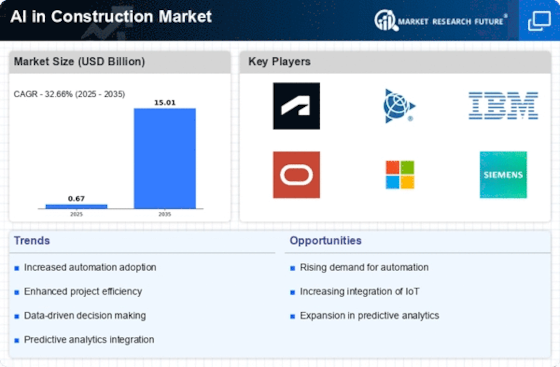Project Planning
Safety Management
Quality Control
Predictive Maintenance
Site Management
Machine Learning
Natural Language Processing
Computer Vision
Robotics
Big Data Analytics
Residential
Commercial
Infrastructure
Industrial
Specialty
Software
Hardware
Services
North America
Europe
South America
Asia Pacific
Middle East and Africa
North America Outlook (USD Billion, 2019-2035)
North America AI in Construction Market by Application Type
Project Planning
Safety Management
Quality Control
Predictive Maintenance
Site Management
North America AI in Construction Market by Technology Type
Machine Learning
Natural Language Processing
Computer Vision
Robotics
Big Data Analytics
North America AI in Construction Market by End Use Type
Residential
Commercial
Infrastructure
Industrial
Specialty
North America AI in Construction Market by Solution Type
Software
Hardware
Services
North America AI in Construction Market by Regional Type
US
Canada
US Outlook (USD Billion, 2019-2035)
US AI in Construction Market by Application Type
Project Planning
Safety Management
Quality Control
Predictive Maintenance
Site Management
US AI in Construction Market by Technology Type
Machine Learning
Natural Language Processing
Computer Vision
Robotics
Big Data Analytics
US AI in Construction Market by End Use Type
Residential
Commercial
Infrastructure
Industrial
Specialty
US AI in Construction Market by Solution Type
Software
Hardware
Services
CANADA Outlook (USD Billion, 2019-2035)
CANADA AI in Construction Market by Application Type
Project Planning
Safety Management
Quality Control
Predictive Maintenance
Site Management
CANADA AI in Construction Market by Technology Type
Machine Learning
Natural Language Processing
Computer Vision
Robotics
Big Data Analytics
CANADA AI in Construction Market by End Use Type
Residential
Commercial
Infrastructure
Industrial
Specialty
CANADA AI in Construction Market by Solution Type
Software
Hardware
Services
Europe Outlook (USD Billion, 2019-2035)
Europe AI in Construction Market by Application Type
Project Planning
Safety Management
Quality Control
Predictive Maintenance
Site Management
Europe AI in Construction Market by Technology Type
Machine Learning
Natural Language Processing
Computer Vision
Robotics
Big Data Analytics
Europe AI in Construction Market by End Use Type
Residential
Commercial
Infrastructure
Industrial
Specialty
Europe AI in Construction Market by Solution Type
Software
Hardware
Services
Europe AI in Construction Market by Regional Type
Germany
UK
France
Russia
Italy
Spain
Rest of Europe
GERMANY Outlook (USD Billion, 2019-2035)
GERMANY AI in Construction Market by Application Type
Project Planning
Safety Management
Quality Control
Predictive Maintenance
Site Management
GERMANY AI in Construction Market by Technology Type
Machine Learning
Natural Language Processing
Computer Vision
Robotics
Big Data Analytics
GERMANY AI in Construction Market by End Use Type
Residential
Commercial
Infrastructure
Industrial
Specialty
GERMANY AI in Construction Market by Solution Type
Software
Hardware
Services
UK Outlook (USD Billion, 2019-2035)
UK AI in Construction Market by Application Type
Project Planning
Safety Management
Quality Control
Predictive Maintenance
Site Management
UK AI in Construction Market by Technology Type
Machine Learning
Natural Language Processing
Computer Vision
Robotics
Big Data Analytics
UK AI in Construction Market by End Use Type
Residential
Commercial
Infrastructure
Industrial
Specialty
UK AI in Construction Market by Solution Type
Software
Hardware
Services
FRANCE Outlook (USD Billion, 2019-2035)
FRANCE AI in Construction Market by Application Type
Project Planning
Safety Management
Quality Control
Predictive Maintenance
Site Management
FRANCE AI in Construction Market by Technology Type
Machine Learning
Natural Language Processing
Computer Vision
Robotics
Big Data Analytics
FRANCE AI in Construction Market by End Use Type
Residential
Commercial
Infrastructure
Industrial
Specialty
FRANCE AI in Construction Market by Solution Type
Software
Hardware
Services
RUSSIA Outlook (USD Billion, 2019-2035)
RUSSIA AI in Construction Market by Application Type
Project Planning
Safety Management
Quality Control
Predictive Maintenance
Site Management
RUSSIA AI in Construction Market by Technology Type
Machine Learning
Natural Language Processing
Computer Vision
Robotics
Big Data Analytics
RUSSIA AI in Construction Market by End Use Type
Residential
Commercial
Infrastructure
Industrial
Specialty
RUSSIA AI in Construction Market by Solution Type
Software
Hardware
Services
ITALY Outlook (USD Billion, 2019-2035)
ITALY AI in Construction Market by Application Type
Project Planning
Safety Management
Quality Control
Predictive Maintenance
Site Management
ITALY AI in Construction Market by Technology Type
Machine Learning
Natural Language Processing
Computer Vision
Robotics
Big Data Analytics
ITALY AI in Construction Market by End Use Type
Residential
Commercial
Infrastructure
Industrial
Specialty
ITALY AI in Construction Market by Solution Type
Software
Hardware
Services
SPAIN Outlook (USD Billion, 2019-2035)
SPAIN AI in Construction Market by Application Type
Project Planning
Safety Management
Quality Control
Predictive Maintenance
Site Management
SPAIN AI in Construction Market by Technology Type
Machine Learning
Natural Language Processing
Computer Vision
Robotics
Big Data Analytics
SPAIN AI in Construction Market by End Use Type
Residential
Commercial
Infrastructure
Industrial
Specialty
SPAIN AI in Construction Market by Solution Type
Software
Hardware
Services
REST OF EUROPE Outlook (USD Billion, 2019-2035)
REST OF EUROPE AI in Construction Market by Application Type
Project Planning
Safety Management
Quality Control
Predictive Maintenance
Site Management
REST OF EUROPE AI in Construction Market by Technology Type
Machine Learning
Natural Language Processing
Computer Vision
Robotics
Big Data Analytics
REST OF EUROPE AI in Construction Market by End Use Type
Residential
Commercial
Infrastructure
Industrial
Specialty
REST OF EUROPE AI in Construction Market by Solution Type
Software
Hardware
Services
APAC Outlook (USD Billion, 2019-2035)
APAC AI in Construction Market by Application Type
Project Planning
Safety Management
Quality Control
Predictive Maintenance
Site Management
APAC AI in Construction Market by Technology Type
Machine Learning
Natural Language Processing
Computer Vision
Robotics
Big Data Analytics
APAC AI in Construction Market by End Use Type
Residential
Commercial
Infrastructure
Industrial
Specialty
APAC AI in Construction Market by Solution Type
Software
Hardware
Services
APAC AI in Construction Market by Regional Type
China
India
Japan
South Korea
Malaysia
Thailand
Indonesia
Rest of APAC
CHINA Outlook (USD Billion, 2019-2035)
CHINA AI in Construction Market by Application Type
Project Planning
Safety Management
Quality Control
Predictive Maintenance
Site Management
CHINA AI in Construction Market by Technology Type
Machine Learning
Natural Language Processing
Computer Vision
Robotics
Big Data Analytics
CHINA AI in Construction Market by End Use Type
Residential
Commercial
Infrastructure
Industrial
Specialty
CHINA AI in Construction Market by Solution Type
Software
Hardware
Services
INDIA Outlook (USD Billion, 2019-2035)
INDIA AI in Construction Market by Application Type
Project Planning
Safety Management
Quality Control
Predictive Maintenance
Site Management
INDIA AI in Construction Market by Technology Type
Machine Learning
Natural Language Processing
Computer Vision
Robotics
Big Data Analytics
INDIA AI in Construction Market by End Use Type
Residential
Commercial
Infrastructure
Industrial
Specialty
INDIA AI in Construction Market by Solution Type
Software
Hardware
Services
JAPAN Outlook (USD Billion, 2019-2035)
JAPAN AI in Construction Market by Application Type
Project Planning
Safety Management
Quality Control
Predictive Maintenance
Site Management
JAPAN AI in Construction Market by Technology Type
Machine Learning
Natural Language Processing
Computer Vision
Robotics
Big Data Analytics
JAPAN AI in Construction Market by End Use Type
Residential
Commercial
Infrastructure
Industrial
Specialty
JAPAN AI in Construction Market by Solution Type
Software
Hardware
Services
SOUTH KOREA Outlook (USD Billion, 2019-2035)
SOUTH KOREA AI in Construction Market by Application Type
Project Planning
Safety Management
Quality Control
Predictive Maintenance
Site Management
SOUTH KOREA AI in Construction Market by Technology Type
Machine Learning
Natural Language Processing
Computer Vision
Robotics
Big Data Analytics
SOUTH KOREA AI in Construction Market by End Use Type
Residential
Commercial
Infrastructure
Industrial
Specialty
SOUTH KOREA AI in Construction Market by Solution Type
Software
Hardware
Services
MALAYSIA Outlook (USD Billion, 2019-2035)
MALAYSIA AI in Construction Market by Application Type
Project Planning
Safety Management
Quality Control
Predictive Maintenance
Site Management
MALAYSIA AI in Construction Market by Technology Type
Machine Learning
Natural Language Processing
Computer Vision
Robotics
Big Data Analytics
MALAYSIA AI in Construction Market by End Use Type
Residential
Commercial
Infrastructure
Industrial
Specialty
MALAYSIA AI in Construction Market by Solution Type
Software
Hardware
Services
THAILAND Outlook (USD Billion, 2019-2035)
THAILAND AI in Construction Market by Application Type
Project Planning
Safety Management
Quality Control
Predictive Maintenance
Site Management
THAILAND AI in Construction Market by Technology Type
Machine Learning
Natural Language Processing
Computer Vision
Robotics
Big Data Analytics
THAILAND AI in Construction Market by End Use Type
Residential
Commercial
Infrastructure
Industrial
Specialty
THAILAND AI in Construction Market by Solution Type
Software
Hardware
Services
INDONESIA Outlook (USD Billion, 2019-2035)
INDONESIA AI in Construction Market by Application Type
Project Planning
Safety Management
Quality Control
Predictive Maintenance
Site Management
INDONESIA AI in Construction Market by Technology Type
Machine Learning
Natural Language Processing
Computer Vision
Robotics
Big Data Analytics
INDONESIA AI in Construction Market by End Use Type
Residential
Commercial
Infrastructure
Industrial
Specialty
INDONESIA AI in Construction Market by Solution Type
Software
Hardware
Services
REST OF APAC Outlook (USD Billion, 2019-2035)
REST OF APAC AI in Construction Market by Application Type
Project Planning
Safety Management
Quality Control
Predictive Maintenance
Site Management
REST OF APAC AI in Construction Market by Technology Type
Machine Learning
Natural Language Processing
Computer Vision
Robotics
Big Data Analytics
REST OF APAC AI in Construction Market by End Use Type
Residential
Commercial
Infrastructure
Industrial
Specialty
REST OF APAC AI in Construction Market by Solution Type
Software
Hardware
Services
South America Outlook (USD Billion, 2019-2035)
South America AI in Construction Market by Application Type
Project Planning
Safety Management
Quality Control
Predictive Maintenance
Site Management
South America AI in Construction Market by Technology Type
Machine Learning
Natural Language Processing
Computer Vision
Robotics
Big Data Analytics
South America AI in Construction Market by End Use Type
Residential
Commercial
Infrastructure
Industrial
Specialty
South America AI in Construction Market by Solution Type
Software
Hardware
Services
South America AI in Construction Market by Regional Type
Brazil
Mexico
Argentina
Rest of South America
BRAZIL Outlook (USD Billion, 2019-2035)
BRAZIL AI in Construction Market by Application Type
Project Planning
Safety Management
Quality Control
Predictive Maintenance
Site Management
BRAZIL AI in Construction Market by Technology Type
Machine Learning
Natural Language Processing
Computer Vision
Robotics
Big Data Analytics
BRAZIL AI in Construction Market by End Use Type
Residential
Commercial
Infrastructure
Industrial
Specialty
BRAZIL AI in Construction Market by Solution Type
Software
Hardware
Services
MEXICO Outlook (USD Billion, 2019-2035)
MEXICO AI in Construction Market by Application Type
Project Planning
Safety Management
Quality Control
Predictive Maintenance
Site Management
MEXICO AI in Construction Market by Technology Type
Machine Learning
Natural Language Processing
Computer Vision
Robotics
Big Data Analytics
MEXICO AI in Construction Market by End Use Type
Residential
Commercial
Infrastructure
Industrial
Specialty
MEXICO AI in Construction Market by Solution Type
Software
Hardware
Services
ARGENTINA Outlook (USD Billion, 2019-2035)
ARGENTINA AI in Construction Market by Application Type
Project Planning
Safety Management
Quality Control
Predictive Maintenance
Site Management
ARGENTINA AI in Construction Market by Technology Type
Machine Learning
Natural Language Processing
Computer Vision
Robotics
Big Data Analytics
ARGENTINA AI in Construction Market by End Use Type
Residential
Commercial
Infrastructure
Industrial
Specialty
ARGENTINA AI in Construction Market by Solution Type
Software
Hardware
Services
REST OF SOUTH AMERICA Outlook (USD Billion, 2019-2035)
REST OF SOUTH AMERICA AI in Construction Market by Application Type
Project Planning
Safety Management
Quality Control
Predictive Maintenance
Site Management
REST OF SOUTH AMERICA AI in Construction Market by Technology Type
Machine Learning
Natural Language Processing
Computer Vision
Robotics
Big Data Analytics
REST OF SOUTH AMERICA AI in Construction Market by End Use Type
Residential
Commercial
Infrastructure
Industrial
Specialty
REST OF SOUTH AMERICA AI in Construction Market by Solution Type
Software
Hardware
Services
MEA Outlook (USD Billion, 2019-2035)
MEA AI in Construction Market by Application Type
Project Planning
Safety Management
Quality Control
Predictive Maintenance
Site Management
MEA AI in Construction Market by Technology Type
Machine Learning
Natural Language Processing
Computer Vision
Robotics
Big Data Analytics
MEA AI in Construction Market by End Use Type
Residential
Commercial
Infrastructure
Industrial
Specialty
MEA AI in Construction Market by Solution Type
Software
Hardware
Services
MEA AI in Construction Market by Regional Type
GCC Countries
South Africa
Rest of MEA
GCC COUNTRIES Outlook (USD Billion, 2019-2035)
GCC COUNTRIES AI in Construction Market by Application Type
Project Planning
Safety Management
Quality Control
Predictive Maintenance
Site Management
GCC COUNTRIES AI in Construction Market by Technology Type
Machine Learning
Natural Language Processing
Computer Vision
Robotics
Big Data Analytics
GCC COUNTRIES AI in Construction Market by End Use Type
Residential
Commercial
Infrastructure
Industrial
Specialty
GCC COUNTRIES AI in Construction Market by Solution Type
Software
Hardware
Services
SOUTH AFRICA Outlook (USD Billion, 2019-2035)
SOUTH AFRICA AI in Construction Market by Application Type
Project Planning
Safety Management
Quality Control
Predictive Maintenance
Site Management
SOUTH AFRICA AI in Construction Market by Technology Type
Machine Learning
Natural Language Processing
Computer Vision
Robotics
Big Data Analytics
SOUTH AFRICA AI in Construction Market by End Use Type
Residential
Commercial
Infrastructure
Industrial
Specialty
SOUTH AFRICA AI in Construction Market by Solution Type
Software
Hardware
Services
REST OF MEA Outlook (USD Billion, 2019-2035)
REST OF MEA AI in Construction Market by Application Type
Project Planning
Safety Management
Quality Control
Predictive Maintenance
Site Management
REST OF MEA AI in Construction Market by Technology Type
Machine Learning
Natural Language Processing
Computer Vision
Robotics
Big Data Analytics
REST OF MEA AI in Construction Market by End Use Type
Residential
Commercial
Infrastructure
Industrial
Specialty
REST OF MEA AI in Construction Market by Solution Type
Software
Hardware
Services


















Leave a Comment